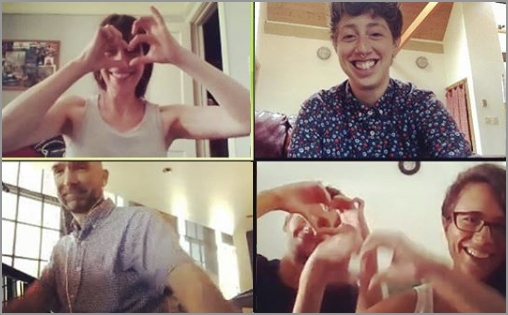Coming to Terms With Life as a Disabled Multipotentialite
I grew up disabled in a third world country, which meant watching people celebrate my basic milestones instead of providing me with an equally inclusive space. Growing up as a disabled multipotentialite was somehow even more confusing. Those like me were not only cheered on for basic achievements like attending and succeeding at school, but were heralded as “geniuses” for doing these things.
In India, Inspiration porn—“the portrayal of people with disabilities as being inspirational to able-bodied people on the basis of their life circumstances”—is not only rampant but cherished. As a multipotentialite in the making, I was confused by being placed on a pedestal by everyone I encountered outside my family—Look at her, she goes to a school, plays the bass and writes! Being congratulated for wanting to do everything and having diverse interests may seem harmless at first, but for a disabled individual, it can be triggering. This excessive praise is a form of ableism. It’s never encouraging to be looked upon as doing well for myself despite a disability.
One of the worst things you can do to a disabled person is celebrate their basic right to life. If I pursued two hobbies, they were celebrated. If I made friends, I was encouraged to share my experience and inspire others like me. As a young multipotentialite, I was looked upon as someone compensating for her disability by overcompensating in the other fields. If I was interested in five different fandoms and four different disciplines at school, it was seen as a brave disabled person instead of a brave multipotentialite.
It took a lot of unlearning in therapy with a trained counselor to unpack my years of conditioning and to learn how to speak up against how I’m perceived as a disabled multipotentialite. At first, I felt an uncontrollable need to rage—until I learned coping mechanisms.
Here are a few things that helped me understand how to look past my rage and love and accept my two intersecting identities: multipotentialite and disabled person.
Nobody knows your journey better than youBeing born disabled meant that I came to consciousness knowing myself via the ways others saw me—as brave, bold and fearless. None of these virtues were acquired as skills. As far as my treatment journey was concerned, my fearlessness was fed to me. I was conditioned to believe that I was extremely brave and I did not need to cry, as crying spelled weakness. As a multipotentialite, I practiced these traits by shuttling between pursuits and ambitions. However, as I grew older, a fear of not being good enough started to gnaw at me. I began to have external outbursts—breakdowns, which were seen as “uncharacteristic” of my overall persona. As a disabled child, I hadn’t been allowed to develop that persona myself. It had been handed to me by peers, guardians and family, and it didn’t feel authentic to me.
As a multipotentialite, it is difficult to accept that I have to pause my life frequently to endure multiple hospital visits and treatments. I sometimes break down at the prospect that a personal project has failed due to my health and impending hospital visits. I was seeing my life’s journey through the eyes of others, who perceived me to be a certain way when I felt completely at odds with that role.
In therapy, I learned to understand that it was okay to fail and okay to embrace both fear and strength as time allowed. I began to understand the value of acknowledging my fear. I vocalized my insecurities about surviving the pandemic as someone who lives with chronic illness. This allowed me to grow as a multipotentialite, too. I had been constantly stressed about being the best in every project I undertook. In therapy, I learned that my progress doesn’t have to be linear. I started out wanting to be the best at everything, but my journey as a disabled multipotentialite meant embracing my failures and telling my story boldly. Whether that meant success or failure? That was secondary. My truth is mine alone, and it’s not written by someone who doesn’t know all the parts that make me who I am.
Today, I pursue my multipotentialite projects through the lens of enjoyment, and being a little silly wherever possible. I no longer allow others to write my narrative and control it. I own my strength and my vulnerability.
Asking for help isn’t a sign of weaknessOne of the first things my parents instilled in me is that I am no less than anyone else I encounter in life. Thus, asking for help was never an option for me. While that may have fueled the feminist agenda, it was personally counterproductive. In the interest of me not seeking help, my parents provided me with absolute accessibility and inclusivity. This ought to exist in the wider world, but as a multipotentialite who is also disabled, I’ve rarely seen my needs met by the world at large. While my needs were addressed in a private capacity by my family, making my life easier, this never translated to my larger sociopolitical context. Asking for an inclusive environment was seen as a sign of weakness.
Since my disability is “invisible” and I “look” functional, I have never relied on asking for external help or taking advantage of any “perks” offered to those with disabilities. This meant that I steered clear of stating any of my special needs until recently. I believed that not seeking help would make me appear tougher and that people would then take me seriously. However, this attitude started affecting my life and my work. The internal pressure that I put on myself to always deliver 110% helped me perform as a multipotentialite. I could juggle hobbies, activities, ambitions and passions seemingly flawlessly! But all that pressure affected my life, when paired with living with my chronic illness.
In the last few years, I have had to come to terms with asking for help and seeking time to adjust my life according to my “special” needs. It took a while to accept this, and even now I struggle to make my needs heard. It helps when I am in an environment that anticipates some of those needs for me. Today, I find it convenient to tell potential dates and employers about my condition, so they know what to expect from me. This also allows time for them to be able to provide me an inclusive space.
I started out wanting to be the best at everything, but my journey as a disabled multipotentialite meant embracing my failures and telling my story boldly. Whether that meant success or failure? That was secondary. My truth is mine alone, and it’s not written by someone who doesn’t know all the parts that make me who I am.
Juggling ambitions while living with chronic health condition is a challenge
Perhaps the only time I feel like I’m letting myself down is when my physical state does not allow me to pursue my goals and passions at the pace and in the ways I would like. I can’t take a leap of faith and leave town to travel and explore the world, even if I wanted to. There are certain physical activities that I cannot pursue when my health is deteriorating. Honestly, sometimes even functioning at my day job becomes a challenge. As a multipotentialite, this is a bitter pill to swallow. On one hand, I can and want to pursue everything. On the other, my chronic disease and I are completely tied, and my whole life must play out within the limitations of that bond. This might sound familiar to those who struggle with motor disability or identify as neurodivergent, too. While we can be as ambitious as an able-bodied person, our pursuits will always be bounded by our condition and how we are coping through it.
While living with a disability can restrict your options for pursuing many things, it does not mean that you allow the disability to get the best of you in all situations. What helps me find my center is taking creative liberties to turn difficult situations around. I make sure to reserve sedentary hobbies and passion projects for times when I have to spend a day in a hospital bed. I know I’ll be all alone and will have the time to follow through on what I’m working on. There are always hardships, but the silver lining in being a disabled multipotentialite is the frugality and innovation you learn around keeping yourself occupied and happy through your journey. You have to accept the whole package—the good, the bad, the ugly and the easygoing, chronically ill self.
Your turnIf you are an able-bodied multipotentialite, do you ever feel restricted or limited by the conditions of your life? If you are living with chronic disease(s), do you ever feel exhausted by trying to cope with them along with being true to your multipotentialite self? I would love to hear from you on the states and conditions that are out of your control and limit your passion projects.
 Doing/being/exploring ALL THE THINGS is easier with a community!
Doing/being/exploring ALL THE THINGS is easier with a community!
Did you know we have a private community of hundreds of multipotentialites from around the world? We support each other, share advice and cheer each other on as we building lives and career around ALL our passions.
Learn more about the Puttyverse and get notified next time we open the doors:

The post Coming to Terms With Life as a Disabled Multipotentialite appeared first on Puttylike.



